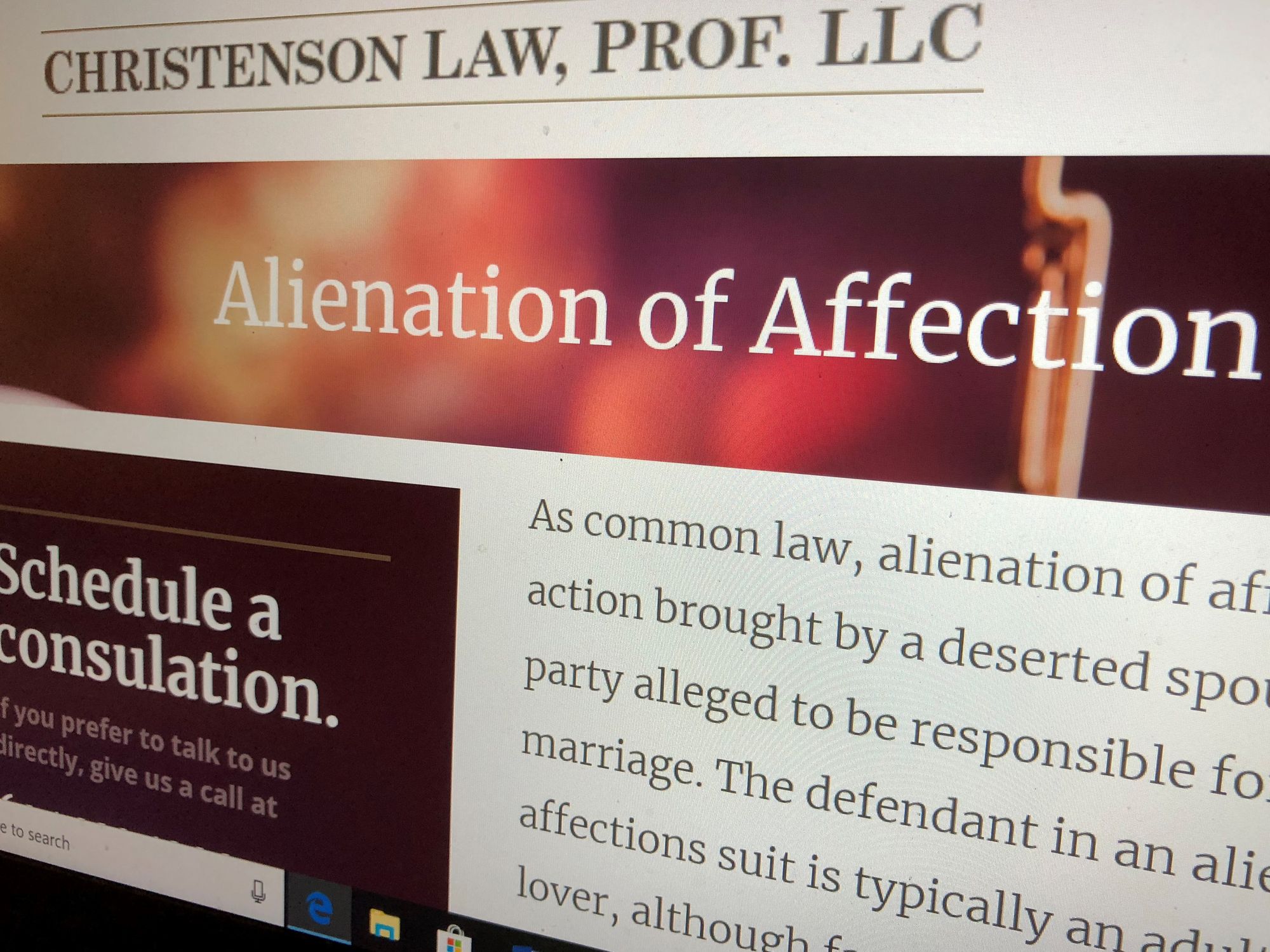Under the tenets of ancient English common law, when wives were legally considered the property of their husbands, a jilted husband could sue any man who deliberately broke up his marriage and stole away his wife.
Even as centuries have passed, and society has generally done away with the notion of wives as property, the state of South Dakota has kept a version of that civil law on the books.
The state is one of only seven U.S. states to retain the civil action known as “alienation of affection” in state law.
One element of the tort was argued before the South Dakota Supreme Court in October, though that case is unlikely to result in removal of the law in the state.
Meanwhile, a long-term controversy continues to rage in the South Dakota legal and legislative communities over whether the law is an appropriate way to resolve disputes over third-party involvement in breaking up a marriage and if financial damages should be rewarded as a result.
Cases typically surround marriages between well-heeled individuals who are worth suing when an affair occurs and a marriage ends.
A man was awarded $950,000 in a 2002 case in which a South Dakota jury ruled that an orthopedic surgeon from Las Vegas had enticed the man’s wife into an affair and had broken up their marriage. The judgment was later reduced to $400,000.
A small number of alienation cases remain active in the state. The tort language was expanded to be gender-neutral by the state Legislature in 2002 by allowing women to sue another woman for a break-up.
Opponents of the alienation tort argue that it treats people as a commodity, puts a price tag on an emotion, and leads to humiliating public revelations of infidelity that can harm the adults and children involved far beyond that impacts of a typical divorce proceeding.
Roger Baron, a professor emeritus in the University of South Dakota Law School, said the alienation tort is unnecessary because divorce laws already enable fault to be determined and financial remedies to be assessed.
“It’s kind of a mess, and it continues to be a mess,” said Baron, author of the legal textbook “Cases and Materials on Family Law for the South Dakota Lawyer.” “Just because something bad has happened to someone in life doesn’t mean you have a cause to sue for it. It’s not saying we’re not sympathetic to you, but it’s not something you should be able to file a lawsuit over.”
That view is countered by experts who argue that marriage is a legal contract like any other agreement that can be broken and lead to damages when someone interferes. Some experts say alienation lawsuits are comparable to any malpractice or civil injury suit in which the actions of a person cause pain, suffering and financial loss to another.
Sioux Falls attorney Robert Christenson, a leading alienation of affection lawyer in the state, says alienation cases can be handled with dignity and serve as a way for a spouse whose marriage is broken up to be compensated financially for loss of love, companionship and an expectation of earnings.
“When you get in a car accident driving home and you have pain and suffering and emotionally you can’t deal with the pain, that’s no different than this,” said Christenson. “In our system we compensate for loss with money. We’re not compensating for a person, we’re compensating for a relationship, a feeling of love and affection that is taken.”
Christenson said alienation cases also allow for healing on the part of the jilted spouse whose life has been intentionally turned upside down by the actions of another.
“People come in here, and they’re hurting; they don’t understand why this happened, and by and large they’re trying to heal from it,” he said. “These cases, believe it or not, advance the healing process for these people because their spirits are hurting.”
Three elements of alienation of affection
In order to prove alienation of affection and have damages awarded, a spouse whose marriage has been broken up by someone must prove three key elements in court:
- That the marriage in question contained a degree of love or affection prior to the outside affair or influence.
- That the adulterous relationship alienated or destroyed that love or affection.
- And that the defendant’s malicious conduct contributed to or caused the loss of affection or love.
Rare cases, tough to prove
Alienation of affection is part of a group of English common law civil remedies known as “heart balm” laws, which include suing over violating a promise to marry or for so-called “criminal conversation” in which a man could sue any other man who had sex with his wife.
“The rationale is that your heart is broken and there’s a balm you can put on that to soothe it, and the money is the balm,” Baron said.
Most of those torts have been stricken from state and federal laws, but alienation has been retained in South Dakota, Hawaii, Illinois, Mississippi, New Mexico, North Carolina and Utah.
The South Dakota alienation law is contained within Title 20, a section known as Personal Rights and Obligations. The law, 20-9-7, includes language forbidding “abduction or enticement” of a husband from his wife or a wife from her husband. The language specific to alienation forbids the “seduction of a wife, daughter or orphan sister,” and the new language added in 2002 which now forbids “the seduction of a husband, son or orphan brother.”
The text regarding children, Baron said, applies to rare instances where one parent may seek remedies from the other parent who turns a child against them or physically removes them from the relationship.
Supporters of alienation of affection argue that it is limited in scope due to the high legal standard which must be met in order for damages to be awarded.
The three main elements that must be proven in an alienation case are that the marriage in question contained a degree of love or affection prior to the outside affair; that the affair alienated or destroyed that love or affection; and that the defendant’s malicious conduct contributed to or caused the loss of affection or love.
Jonathan Van Patten, a professor in the USD Law School who represented clients in alienation cases when he was in private practice, said the law essentially requires a plaintiff to show that someone who had an affair with a married person exploited a situation and “intentionally set out to” to break up or disrupt a happy marriage.
“It’s not like if someone who’s married has an affair you can get sued, because the requirements are much higher than that,” Van Patten said. “You’ve really got to have a smoking gun.”
Van Patten cited one case he tried in which a note from the defendant to the married woman specifically mentioned that he knew the woman was married and that he didn’t care if the affair broke up the marriage.
“It was clear he knew what he was doing, that he was actively wooing her even though she was married,” Van Patten said.
Van Patten said he understands that some people are uncomfortable with alienation of affection as a legal concept. But he said the law simply addresses marriage as a form of legal contract not unlike a business or employment contract. He said ownership or treating a person as property is no longer part of the tort.
“We always defend it, not on that basis, but on the modern basis that the law in many, many instances, and generally in commercial context, the law protects contracts,” he said. “We have other torts called interference with contractual relations, and we feel that a marriage contract should have no less protection than we afford commercial contracts for the sale of tomatoes or of any product.”
Christenson said it’s possible that someone could be sued for alienation of affection even if they never had sex with the married person but instead somehow turned one spouse emotionally away from the other.

Supreme Court hears cases
The South Dakota Supreme Court has been the final stop for several alienation of affection cases.
One element of alienation of affection was argued before the state Supreme Court in October. In the 2017 case of Cedar versus Johnson, a man in Frederick, S.D., argued that his wife was stolen from him by the owner of the bar where she worked, ultimately breaking up his marriage and leading to divorce. A trial judge dismissed the case because the plaintiff did not during the trial testify or make a statement as “to the pecuniary value of his loss of love and/or consortium, physical pain, mental agony, lacerated feelings, wounded sensibilities, humiliation, blow to honor, hurt to family life, suspicion cast on offspring, etc.”
The judge ruled that by not placing a firm financial value on his loss, the plaintiff did not make a case for damages, and he threw out the case. The Supreme Court justices were asked in an appeal by the plaintiff’s attorney to rule on whether the plaintiff or his attorney had a legal obligation to set a value on the woman’s affection, rather than simply allowing the jury to decide the financial value of the affection or the marriage. A ruling on the case is expected in the coming months.
Through the years, the South Dakota Supreme Court justices have both defended and expressed dismay about the alienation of affection law. Writing on behalf of the majority that upheld the law in the 1981 case of Hunt versus Hunt, then-Justice Francis G. Dunn said the tort is relevant in the modern world to prevent attacks on the institution of marriage.
“Finally, because we happen to be living in a period of loose morals and frequent extramarital involvements is no reason for a court to put its stamp of approval on this conduct,” Dunn wrote. “And I feel certain that a case will arise in the future where some party has so flagrantly broken up a stable marriage that we would rue the day that an alienation suit was not available to the injured party.”
However, in the same case, then-Justice Frank “Rudy” Henderson wrote a scathing indictment of the tort.
“The underlying rationale for alienation suits, that is, the preservation of the marriage, is ludicrous,” Henderson wrote. “Alienation of affection … as a remedy fosters bitterness, promotes vexatious lawsuits, uses the marriage as a means of blackmail and character assassination, puts the marriage in the marketplace, and generally exposes the marriage to a public cleansing with a price tag attached to it.”
Christenson, the Sioux Falls lawyer, said that vindictiveness and revenge are not major components of the alienation cases he’s handled over the years, and he rejects Justice Henderson’s view of the tort.
“That doesn’t happen when people come to see me,” Christenson said. “Henderson was a bombastic judge, and the fact of the matter is, he’s wrong.”
If plaintiffs are seen as bringing the suit to harass or embarrass their former spouse, juries will feel compassion for the defendant and rule in their favor, he said.
About three-quarters of the alienation cases he takes are settled before trial, and most are taken on a contingency basis, Christenson said.
In the Hunt case in 1981, Henderson joined with then-Justice Roger L. Wollman to argue that the tort has outlived its usefulness, noting that alienation was one of several common law legal remedies that are “archaic holdovers from an era when wives were considered to be the chattel,” or possession, of their spouse.
Christenson rejects the notion that modern alienation cases are sexist or view wives as being owned by their husbands. He said he has handled a few dozen cases in the past 15 years and that about half involved men suing men over alienation of a wife’s affection and the other half included women who sued women over loss of a husband’s affection.
“This idea that women are property, that may have been true at some point in time but it isn’t true now,” said Christenson, who receives about two or three inquiries about alienation cases each month and takes on four of five alienation cases a year.
"It's kind of a mess, and it continues to be a mess. Just because something bad has happened to someone in life doesn't mean you have a cause to sue for it. It's not saying we're not sympathetic to you, but it's not something you should be able to file a lawsuit over." – Roger Baron, professor emeritus, USD School of Law.
Public shaming can result
Christenson acknowledged that – mostly due to rarity and a curiosity surrounding alienation cases — the media tends to report on cases that make it to trial and that some intimate details of infidelity may be made public.
In a high-profile case in Rapid City in 2012, the Pennington County state’s attorney at the time, Glenn Brenner, was sued by a man who claimed that Brenner engaged in a sexual affair with the man’s wife and had alienated her affection. The case went to the Supreme Court before being sent back to a lower court for trial.
During the legal proceedings, media coverage revealed highly personal accounts of Brenner’s relationship with the woman as well as details of her former marriage to the plaintiff. Court documents and media accounts, still readily available online, highlighted conversations the woman and her former husband had with a marriage counselor as part of a debate over whether the marriage was void of affection prior to her relationship with Brenner.
Reached in Texas, where he is now in private practice, Brenner did not want to comment on the case except to note that the trial judge threw out the alienation claim and ruled in Brenner’s favor. He also noted that he is still married to the woman involved in the case.
Van Patten does not see the potential for public airing of personal details as a reason to vilify alienation as a tort, however. He argues that if people don’t want intimate or racy details of infidelity aired in court or the media that they should behave as though their actions are being recorded and could someday be made public.
“I’ve always liked the idea that character is revealed when you act as if you know that somebody is watching, that you still should do the right thing,” Van Patten said. “The corollary is, well, act as if people are watching, and if you ignore that, it’s at your peril.”

On the books to stay?
Former state Sen. Stan Adelstein, a Rapid City Republican, tried twice during his long legislative career to strike the alienation language from South Dakota law. He failed both times.
“It’s a ridiculous law; the concept of putting a value on a woman,” Adelstein, 87, said during a recent interview at the office of his engineering firm in Rapid City. “The concept that you’re going to get a certain payment for this woman to decide who she loves, and then decide what she’s worth?”
While serving in the House of Representatives in 2002, Adelstein brought a bill to abolish the law in South Dakota. The measure failed, but a committee revived the bill and changed its course, ultimately in a way that may make it harder to strike the law in the future.
In amendments that ultimately were passed into law, legislators made the law applicable to both women and men who were lured away from their spouses. While the law long held that civil torts forbid the “abduction or enticement of a wife from her husband” and the “seduction of a wife,” lawmakers made the tort gender-neutral by adding language that also forbids “the seduction of a husband” into the law.
Adelstein saw the gender-neutral language as a compromise to improve the tort, though he still opposes the concept of alienation of affection. He said the opposition to removing the law hinges on strong conservative beliefs of religious legislators.
“There is a reluctance among some legislators to allow people to behave in a way which to them violates the Bible, and a feeling that marriage is a sacred institution and that anyone who interferes with that deserves to be punished,” Adelstein said. “It’s a pecuniary penalty for violating not a social or economic contract, but a religious contract.”
Baron said it appears as though the both the judiciary and the legislative branches of South Dakota government do not have the fortitude to abolish the alienation tort because on a base level it enables punishment for adultery.
“Both of them want it to be gone but neither of them is willing to bite the bullet and do it,” he said.
During the recent arguments before the state Supreme Court, attorney Thomas Cogley of Aberdeen represented the defendant and asked the justices to not allow the case to move forward. In his arguments, Cogley also asked the justices to abrogate the tort entirely. Reached by phone, Cogley told News Watch he did not want to comment on the case or his request to abolish the tort.
Adelstein said he plans to contact lawmakers before the 2019 legislative session and encourage them to introduce a bill to abolish alienation of affection from state law.
Yet Van Patten said that for the time being, he does not expect the Legislature to eliminate the law.
“There is no active lobby or lobbyist for adulterers, so it’s not like anybody wants to come out and go out on a limb and say this tort is too hard on adulterers,” he said. “There’s no politics that support that, so it’s likely to stay that way.”




